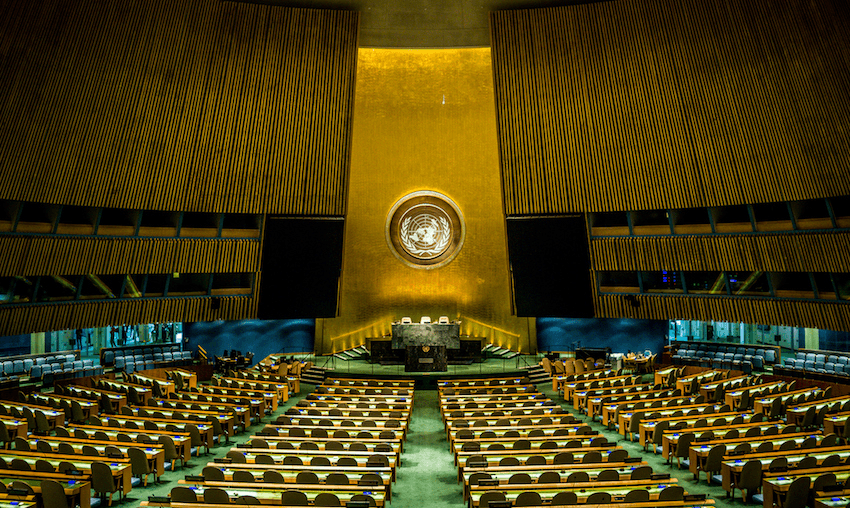As a small country, New Zealand relies heavily on a well-functioning international rules-based system. But as the system weakens, where are our political leaders on the issue? International relations expert Robert Patman writes.
It’s extraordinary that New Zealand’s political leaders haven’t been asked a single question during the 2020 election about the near breakdown of an international rules-based order that’s crucial for safeguarding the country’s interests and values.
Since the end of the Second World War, New Zealand has been a firm supporter of the international rules-based system of international relations, sometimes called the liberal international order, which is characterised by institutions like the United Nations and norms such as multilateralism.
Over the last decade, the global rules-based order has been subject to a three-pronged assault. Authoritarian states like Russia and China have asserted their strategic interests in places such as Ukraine and the South China Sea at the expense of international law, while the US and UK – two of the original architects of the liberal order – have retreated from it.
The nationalist Trump administration has expressed its opposition to multilateralism and withdrawn the US from arrangements such as the Trans-Pacific Partnership, the Paris Climate Accord, the World Health Organisation (WHO) in the midst of a global pandemic, and undermined the World Trade Organisation. Meanwhile, the Johnson government in the UK has not only signed an agreement in January 2020 to withdraw from the EU, a liberal democratic community of 27 states, but also signalled its willingness now to break international law by reneging on aspects of that deal.
At the same time, it’s also evident these challenges have morphed together to create an internal-external threat nexus to the international rules-based order.
Possible Russian involvement in the Brexit vote in the 2016 EU referendum has led to investigations by a UK Parliamentary Committee and the UK Electoral Commission while Special Counsel Robert Mueller’s investigation into alleged Russian interference in the 2016 American presidential election generated more than 30 indictments, including key members of Trump’s campaign team.
These developments present a direct threat to a New Zealand worldview that sees participation in a rules-based order centred on international institutions as an important way of building support for key national goals.
While senior politicians and the media during the 2020 election have devoted little attention to New Zealand’s international interests, it’s time to end this anomaly.
This country is a global trader. Despite a relatively small economy, New Zealand exports of goods and services constitute about 28% as a percentage of GDP, and Wellington has relied on the World Trade Organisation’s comprehensive rules for regulating trade.
Since the mid-1990s, New Zealand has successfully used the machinery of the WTO to resolve disputes with important trade partners, including the US, EU, Australia, Canada and India. In each case, New Zealand has prevailed because the dispute has been decided on the basis of WTO procedures and rules rather than the raw power of the bigger party.
But in recent years, the Trump administration has targeted the global trading system and concluded regional trade agreements such as the United States-Mexico-Canada Agreement (USMCA) to undercut both the principles and reach of WTO’s trade dispute settlement system.
This stance by the Trump team reflects the conviction the international rules-based system and its instrument of choice, multilateral diplomacy, are unacceptable constraints on American sovereignty and power. To a lesser or greater extent, this perspective is shared by Putin’s regime, Xi Jinping’s leadership and the Brexiteer government of Boris Johnson.
However, for New Zealand and the vast majority of states, international rules are important because they offer them the prospect of a voice and influence on global issues that they would not otherwise have.
In other words, New Zealand has a core national interest in clearly upholding the international rules-based system whether it involves relations with China, US or any other players on the global stage.
It’s disconcerting, therefore, that our political leaders seem to have little to say about those foreign actors that are dedicated to weakening the liberal order.
Has the Jacinda Ardern government, for example, warned the Johnson government that breaking international law with respect to the EU Withdrawal agreement is not a sound basis for the negotiation of a New Zealand-UK Free Trade Agreement (FTA)?
Moreover, some of New Zealand’s political leaders have expressed their admiration for adversaries of the international rules-based system.
Foreign minister and New Zealand First leader, Winston Peters, has publicly praised UK Prime Minister Boris Johnson and apparently accepted strategic advice during this election from prominent Brexit figures like Arron Banks and Andy Wigmore, both of whom are outspoken supporters of the Trump administration.
At the same time, Judith Collins, the National Party leader, has made positive noises about the UK “taking back control” from the EU and met last year with Lord Ashcroft, a leading Brexit backer in the UK.
It’s particularly bewildering, after the appalling Christchurch terror atrocity, that Jami-Lee Ross, co-leader of the Advance New Zealand Party, would associate with Steve Bannon – a figure identified with the rise of white nationalism in the US during the last decade.
All this begs the question: what do New Zealand’s political leaders propose to do to protect and strengthen the international rules-based system on which New Zealand’s prosperity and diplomatic influence largely depends?
Robert Patman is a professor of international relations at the University of Otago

